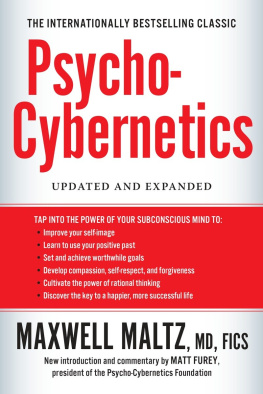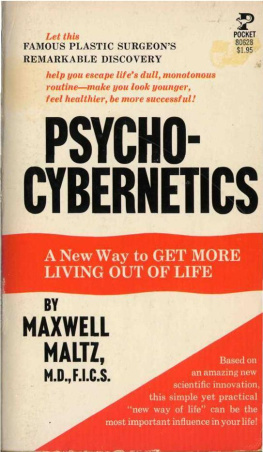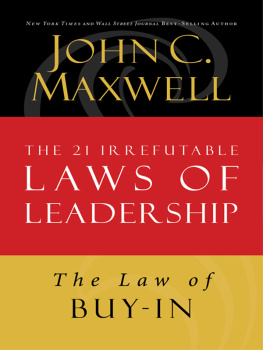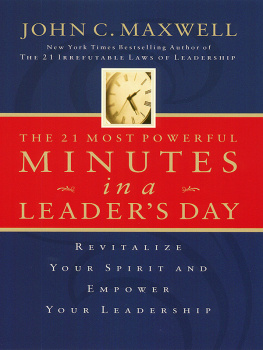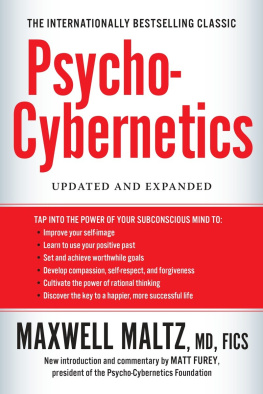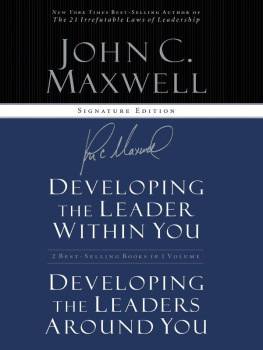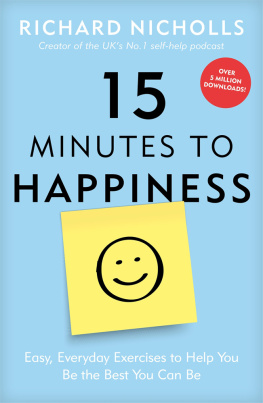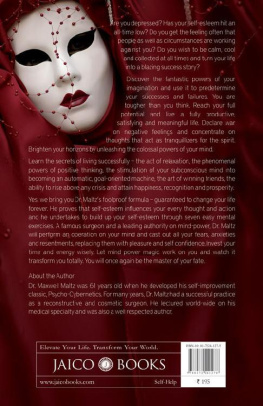Maxwell Maltz - Five Minutes to Happiness
Here you can read online Maxwell Maltz - Five Minutes to Happiness full text of the book (entire story) in english for free. Download pdf and epub, get meaning, cover and reviews about this ebook. year: 2016, publisher: Gildan Media Corporation, genre: Home and family. Description of the work, (preface) as well as reviews are available. Best literature library LitArk.com created for fans of good reading and offers a wide selection of genres:
Romance novel
Science fiction
Adventure
Detective
Science
History
Home and family
Prose
Art
Politics
Computer
Non-fiction
Religion
Business
Children
Humor
Choose a favorite category and find really read worthwhile books. Enjoy immersion in the world of imagination, feel the emotions of the characters or learn something new for yourself, make an fascinating discovery.

- Book:Five Minutes to Happiness
- Author:
- Publisher:Gildan Media Corporation
- Genre:
- Year:2016
- Rating:5 / 5
- Favourites:Add to favourites
- Your mark:
- 100
- 1
- 2
- 3
- 4
- 5
Five Minutes to Happiness: summary, description and annotation
We offer to read an annotation, description, summary or preface (depends on what the author of the book "Five Minutes to Happiness" wrote himself). If you haven't found the necessary information about the book — write in the comments, we will try to find it.
Five Minutes to Happiness — read online for free the complete book (whole text) full work
Below is the text of the book, divided by pages. System saving the place of the last page read, allows you to conveniently read the book "Five Minutes to Happiness" online for free, without having to search again every time where you left off. Put a bookmark, and you can go to the page where you finished reading at any time.
Font size:
Interval:
Bookmark:
PART OF AN EXTERNAL EXPRESSION of happiness is a smile on the face. It is the reverse of a frown. A frown is a symbol of tension, a smile an expression of relaxation. It is obvious then that the essential ingredient of happiness is an atmosphere conducive to relaxation.
Relaxation like tension is a state of mind which means that we can form a habit of relaxation. We do this with the imagination. The whole art of living is the outcome of the use or abuse of the imagination. To use the imagination constructively we build a room where we can do nothing but relax.
As Americans we are wont to indulge in all sorts of pastimes, and one that tickles our fancy very much is the art of building a room-ah by ourselves. Wherever or whenover we can, we do it ourselves. We build the walls, the doors; we put in the window, the closet, the shelves. We paint the walls and the ceiling and we carpet the floor. Some of us even build the furniture and various other conveniences that go with it. The business of doing it ourselves runs into hundreds of millions of dollars annually, proving that this national pastime is here to stay, simply because there is pleasure in it.
Building a room by ourselves, and assembling all the paraphernalia that go with it, merely symbolizes an extension of the physical and spiritual freedom that we have earned by struggle and love so dearly that we are prepared to die to protect it. So we have every right to pamper ourselves, expressing our love of freedom particularly when it comes to our home. We know that it is easier to pull down than to build, but building is a constructive challenge we gladly accept, for beyond the material reward is the pleasure that goes with any creative process. And when this room is done, we know that it is all ours and that we are king in it.
The other day I went to Long Island to have dinner with my nephew and his wife. They guided me to a comfortable chair and pretty Lila handed me a drink.
Where are the kids? I asked.
Theyre upstairs. Theyve had their dinner.
Both boys, eight and seven, and the twins, girls, two years of age, heard my voice and down they came. They rushed over to me urging me to repeat a lesson in How to Whistle, complaining that they were not as yet masters of the art. I put the index and ring fingers of my right hand in my mouth and blew a tremendous whistle. They jumped with joy, then tried to do it themselves but failed. Suddenly they climbed all over me, mussed my hair, and put their fingers in my mouth to get a more accurate idea how it was done. Their dog, a powerful boxer, suddenly made his appearance and, thinking that the children were being molested, barked and jumped on me in an effort to get me away from them.
My nephew Harold rushed the children and their canine buddy up the steps, and I closed my eyes and suppressed a sigh. Suddenly I heard a shot. It was a gun all right, I said to myself, then tried to doze off. A minute later I heard the shot again. Now I listened for it and sure enough I heard it again and again and again.
Whats going on, Harold?
Nothing, Unc. Your nephew Mae is downstairs in the basement.
What is he doing there? Whats all the noise?
Hes building! Hes making a playroom out of the basement.
But whats all the shooting? I asked.
Come down and see.
I went down and saw Mac holding a plank of wood against the wall with his left hand and pointing the gun in his right band against the wood; then he pulled the trigger. He examined the nail be had just fired through the wood into the wall, smiled contentedly, wiped the sweat off his face, greeted me peremptorily, then proceeded to saw the last plank of wood that would finish the job. And it was as beautiful a job indeed as if done by a professional. I knew it would be a wonderful playroom for the children and for the adults as well.
But I also know of building a room in a much easier way despite the fact it was easy for Mac to do it. The room I have in mind does not need any wood planks or guns; nor does it require labor and sweat. It is there for the asking and we can all have it. We build this room with our imagination nothing else.
When we are finished with the excessive tensions of the day-and they will always be there, in the very nature of things - we can replenish our youthful vigor by simply walking through a door-any door of our home into this room this new room, which is the room next door. Of course, it is an imaginary room, a room in our mind. Open the door and walk into it. And a beautiful room it is-all built for us-a solarium, with the sun streaming through it, a veritable garden, filled with flowers and with a fountain bubbling in the middle.
Theres a chair waiting for us. We sit down and relax for a while. We look at the flashing waters of the fountain, breathe in the perfume of the flowers. We rest for a while every day - for just five minutes five minutes that will bring happiness.
To summarize:
1. Imagination is an essential equipment for happiness.
2. So is relaxation-one of our greatest assets.
3. A smile on the face is an expression of relaxation, the reverse of a frown, which is a symbol of tension. It is well to remember what Dale Camegie said: You dont feel like smiling? Then what? First, force yourself to smile. If you are alone, force yourself, to whistle or hum a tune or sing. Act as if you were already happy, and that will tend to make you happy.
4. To use the imagination constructively we build a room in our mind where we do one thing and one thing only Relax!
NOW THAT WE ARE SITTING in this room of our mind, we look out the window and see many sights. Scenes of the past and scenes of the present. We see a day of yesterday, a day in a small town. The phone rings once or twice. The country doctor wakes up slowly, weary from overwork. He gets to the phone, listens, then says he is on his way. Soon he gets into his buggy with his instrument bag, says Giddap to his old dependable horse, and we see him moving over the hills in the rain toward some distant village miles away where a pregnant woman, writhing in pain, is anxiously waiting for him to help bring her child into the world.
Now we see a day of the present, fast automobiles moving back and forth on the highways. We see the rush and the hurry. We see people enter a jet. One of them is a doctor anxious to get to a sick patient hundreds of miles awav. And perhaps Im on the plane too, flying down to Latin America to take care of someone injured somewhere.
Naturally the jet age has its many advantages, but on the other hand the rapid pace at which we live seems to have accelerated our tensions, our social, emotional, and economic conflicts. We seem to get them much faster. That being the case, there is no reason why we cannot learn how to relax, and we dont have to do it on the double.
How do we relax? Well, in the first place the reverse of relaxation is tension and this tension can be expressed both externally and internally. Externally it is expressed in our face, our voice, our chest, and our hands and even our feet. Internally it may be expressed in a spasm of our stomach or our intestines, or even in our blood vessels.
Watch our face under tension. It shows that the muscles are tense; they are contracting without purpose, or more than they should for the problem confronting us. Our forehead is corrugated into a frown and our upper lip is raised; we are on the first lap of developing a crying spell, but we repress it. Continual tension unreleased may cause the muscles around our eyes to twitch. It may make us breathe heavily with our chest muscles, when under normal intelligent conditions we should be breathing from our abdomen, that is, with our diaphragm, slow and easy. If our mouth is not open, we are gritting our teeth or biting our lips, and we are overworking those muscles around our chin. Our voice is not our own because we are uncertain, worried, and timid. Since we are not sure of ourselves, our voice is not sure of itself; it comes out differently, weak and unsteady and unnatural. We fidget with our hands, we roll our fingers, we clench our fist, punch our palm, crack our knuckles or tap our fingers on the table. We talk fast as if we are runn ing and when we sit down we are tapping our foot against the floor or shaking our knee.
Font size:
Interval:
Bookmark:
Similar books «Five Minutes to Happiness»
Look at similar books to Five Minutes to Happiness. We have selected literature similar in name and meaning in the hope of providing readers with more options to find new, interesting, not yet read works.
Discussion, reviews of the book Five Minutes to Happiness and just readers' own opinions. Leave your comments, write what you think about the work, its meaning or the main characters. Specify what exactly you liked and what you didn't like, and why you think so.

